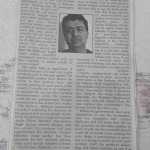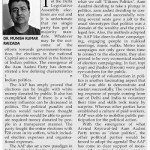The results of Delhi Legislative Assembly elections held on December 4, 2013 are out. A total of 1.19 crore voters casted their ballots to decide the future of 810 candidates, 224 out of them being independent candidates. Congress party and BJP + SAD combine contested all the 70 seats, whereas the new entrant Aaam Aadmi Party, and BSP contested 69 seats each. The results were declared on December 8, with BJP alliance getting 32 seats, Aam Aadmi Party 28, Congress 8 and others claiming 2. The Sheila Dixit-led Congress party was rooted out, with its seats going down from 43 to 8. In terms of vote share, BJP received 34 % votes, AAP 30 % and Congress 25 %. By the time of submission of the article, the verdict is still not out as to who is going to form the government. BJP has emerged the single largest party, but is woefully farther from the magic number of 36 to be able to form the government.
AAP with a tally of 28 legislators has already declared that it would sit in the opposition and would neither seek support nor extend to any other party. With the entry of Aam Aadmi Party, the contest had become triangular. The media had predicted that the outcome would be a hung assembly, with BJP emerging as the single largest party. Whereas the prediction turned out to be largely true, what many experts did not realize the anger of the voters against the ruling party, decimating it to mere single digit number (8).
Whatever be the outcome of the results in terms of government formation, Delhi assembly elections are a watershed in the history of Indian politics. The emergence of Aam Aadmi Party has demonstrated a few defining characteristics in Indian politics.
Aam Aadmi Party has amply proved that elections can be fought with white money donated by public. It also has exemplified that if there is a will, money influence can be decreased in politics. The political pundits and cynics would never have thought that a newbie would be able to generate required money purely through public donations in a transparent manner. The party fought the whole elections with 20 Crores in coffers which included election expenses and organizational expenses.
AAP also set a new paradigm in Indian politics by deciding to implement what we call the phenomenon of primaries or caucuses as practiced in several parts of the world. The candidature of the aspirants for the assembly elections were decided at the primary level (constituency level), rather than the high ups in the party as is the tradition of several major parties in India.
AAP also stirred the Indian politics by rejecting the caste and community equation in fielding the candidates. In Delhi elections, caste and religion were not the primary basis of selecting a candidate and the election results have shown that it went well with the electorate.
These elections have demonstrated another interesting phenomenon of what we call “Citizen Politics”. Aam Aaadmi deciding to take a plunge in politics, aam aadmi deciding to contest elections and successfully winning several seats gave a jolt to the usual stereotypes that politics was a domain of the wealthy and the privileged few. Also, the methods adopted by AAP like door to door campaigning, engaging people in nukkad meetings, music walks, metro train campaigns not only gave them time to connect to the electorate, they also proved to be very economical models of election campaigning. In fact, topi (cap) and jhadoo (broom) were good eye catchers for the public.
The spirit of volunteerism in politics is another fascinating aspect that AAP was able to successfully demonstrate and sustain. The overwhelming response of people coming from out of Delhi and India to volunteer their time and skills took many by surprise. Whereas other parties have established a culture of paid workers, AAP was able to mobilize public participation for the political action.
With the emergence of what Arvind Kejriwal-led Aam Aadmi Party terms as “Clean Politics”, the other political parties would be forced to adopt the agenda! AAP has come in clear support of measures like political parties coming under RTI scanner, a stronger Lokpal Bill, electoral reforms like Right to Reject and Right to Recall. Thus, other political parties have been forced to re-look at their stands. And as we know, sometimes the political parties take up the agenda of the challenger to keep the latter at bay. It remains to be seen how much AAP would be able to shake up the existing political establishment, but undoubtedly the era of new politics demanding more accountability and transparency has arrived!


